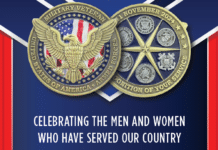The room was silent besides the quivering voices of war-weary veterans sharing experiences from battles long past.
The veterans, soldiers from the historical wars of our nation’s past, shared their stories with students from Lincoln High School, passing on their knowledge to the next generation.
“It is so important to pass history on. If you don’t learn from history you are bound to repeat it — mistakes and all,” Vietnam veteran Paul McCarty said. “For WWII, it is important to pass on how life changing it was for so many people. What a different world it would be now if we had not won the war and it would have went the other way.”
The students, all taking advanced history courses at Lincoln, shared an enthusiasm for our nation’s past — and continued conversations with veterans well past the end of the Tuesday afternoon program.
“I think it is really cool that we get to talk to them, being that we are one of the last generations that will get to talk to them and hear their stories firsthand,” AP History student Ben Thompson said. “The next generation will just learn about it through books.”
Heroism
Stories varied in scope and length as veterans shared inspired accounts of both the triumph and and failures of wartime.
World War II veteran Chet Gardeski, a B-17 flight engineer, told of a European-led bomb design intended to destroy the heavily-fortified cement German submarine bunkers. The bomb was successful in testing, but proved overly cumbersome and ultimately ruled a failure in the field, according to Gardeski.
“There were a lot of secret projects going on during the war, and this was one of the British projects,” Gardeski explained. “To make a long story short, they were not successful. It was too difficult to be able to drop the two bombs accurately and the program just went by the roadside.”
McCarty, a corporal who saw combat in Vietnam, shared the story behind his two purple heart medals. The first McCarty received in 1967 after taking grenade shrapnel to the neck and back while engaged in heavy combat with North Vietnamese troops.
“I was out of action for three weeks, but then went back to my unit,” McCarty said. “We ran into an ambush and called tank fire down. Unfortunately, one of the tank rounds landed right next to me and ended up doing significant damage. I lost part of my right hand, had facial damage, seven teeth broken, cheek bones fractured and my chest laid open. I spent 8 months in the hospital.
“I saw how fortunate I really was,” he added. “There was a lot of people who paid a significant price as opposed to me.”
His 8-month tour of service resulted in post-traumatic stress disorder when he returned — something he said his pets, dogs and horses, helped him through. Few asked for his story when he first returned from Vietnam, but he said now he finds sharing his stories “liberating.”
“It is gratifying to realize that people wanted to hear what I have to say,” McCarty said.
Perspectives of war
The veterans, all members of the Eighth Air Force Historical Society based in Milwaukee, shared commonality in service, but attitudes toward the reality of war varied greatly. McCarty, an infantryman on the ground in Vietnam, was clear in the realities of death.
“I was brought up Catholic, but the Marine Corps changes your thinking; they teach you that that’s the enemy and your job is to get the enemy, get them before they get you.”
WWII Veteran Henry Ratenski, in contrast, saw things from a birds-eye view as a radar operator aboard a B-29B bomber. To him, war was about destroying infrastructure, not people.
“If you are in ground combat, eye to eye killing someone, I think that would probably be very difficult,” he said. “In the Air Force Bombardier Corps, I don’t see a human being. All I see is buildings: the plane manufacturers, the oil refineries. If there is someone by chance there, I don’t know about it.
“You have a certain mission to stop this war. The enemy can quit the war any time they want to and we’ll pull out,” Ratenski continued. “War is irrational. The rational world where we live wouldn’t think of hurting someone else, but we go into a world where killing is the essence of it. You have to kill more of them than you.”
Ratenski, a spry 90-year-old who still wears his original air force attire, said he enjoys sharing his experiences with the youth of today to inspire their interest in history.
“It brings together the generations,” he said. “Here they know we are humans, and I tell them that they are going to be the Americans of tomorrow.”
The students, too, seemed to enjoy the stories and the opportunity to learn history outside of a textbook.
“In class we get the facts,” student Brogan Jindra said. “Here we get the experiences.”
All content herein is owned by author exclusively. Expressed opinions are NOT necessarily the views of VNR, authors, affiliates, advertisers, sponsors, partners, technicians, or VT Network. Some content may be satirical in nature.
All images within are full responsibility of the author and NOT VNR.
Read Full Policy Notice - Comment Policy































Comments are closed.